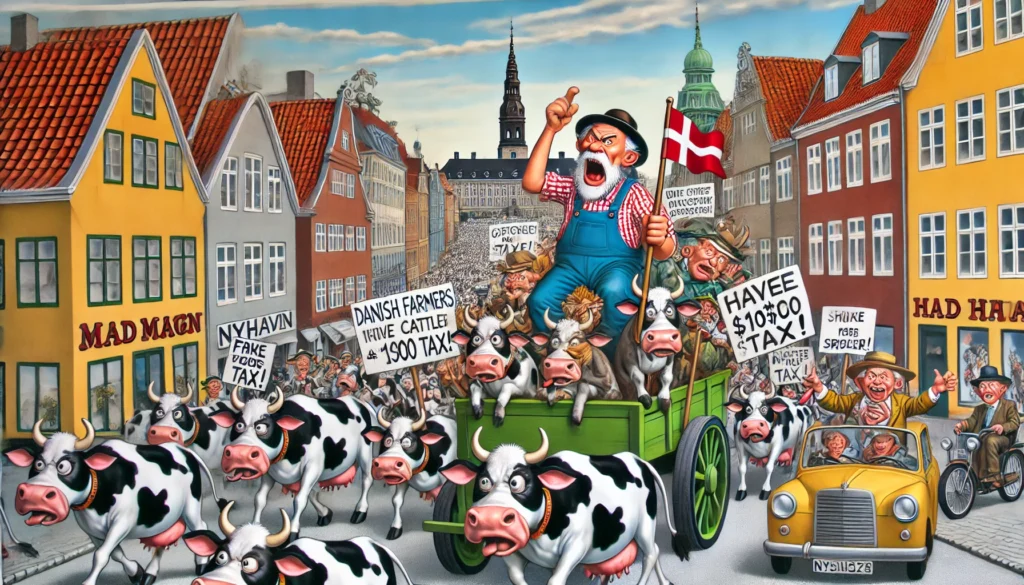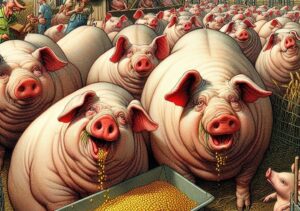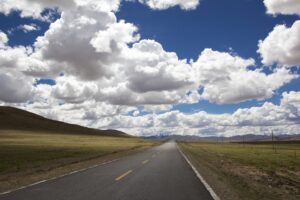
Danish Farmers Revolt A humorous satirical scene showing Danish farmers driving cattle into the streets of Copenhagen in protest of a 100 tax2.webp.webp
Danish Farmers Pissed Over Carbon Tax
When Pigs and Politics Collide
COPENHAGEN (Broken Egg Press) – In what’s being dubbed the “Baconocalypse,” Denmark’s farmers are raising their pitchforks (and a few witty signs) in protest against a proposed carbon emission tax that threatens to transform their bucolic fields into ghost towns. This tax, which could make Denmark the first country to levy such a fee on farming, has sparked a political frenzy worthy of its own reality TV show.
Nothing done about Danish cars! — A tall schoolboy from Aalborg
The Pork Paradox and the Dairy Dilemma
Denmark, known for its bacon and dairy exports, is facing a dilemma of bovine proportions. With plans to impose a tax of up to 750 Danish crowns ($109) per million tons of carbon dioxide (CO2) emitted, the government aims to slash greenhouse gas emissions by 70% from 1990 levels by 2030. However, this well-intentioned eco-move might just result in higher costs for farmers, leading to a reduction in production by as much as one-fifth.
The farming community is not amused. “It’s like being lactose intolerant but loving cheese,” said Peder Tuborgh, CEO of dairy giant Arla Foods. “We’ve already cut emissions by 1 million tons with new technologies, but sure, let’s tax us instead!”
Innovation Station vs. Taxation Inflation
Tuborgh’s lament highlights a core issue: innovation. Arla’s 9,000 farmers across Denmark, Sweden, England, Germany, and Benelux have made significant strides in reducing emissions. But instead of applauding these efforts, the Danish government seems intent on pulling the rug—or rather, the hay—out from under them.
“Why did the farmer cross the road? To avoid the carbon tax! Too bad the tax caught up with him on the other side,” quipped a protestor, holding a sign that read, “Climate goals vs. Dinner Rolls.”
Cows in Denmark will soon be more versed in economics than some graduates, thanks to their new tax liabilities. “Moo means money!”
The Political Pigsty
The political scene in Denmark has turned into a veritable pigsty. With more than half of Denmark’s land farmed and agriculture accounting for about a third of the country’s carbon emissions, the stakes are high. The proposed tax has broad political backing, despite farmers’ protests. It’s as if the politicians are saying, “Let them eat kale!”
Farmers argue that the tax will make their products less competitive internationally, potentially leading to job losses and farm closures. “At 750 Danish crowns per million tons of CO2, our pigs might need to start investing in piggy banks just to keep up,” said Jais Valeur, CEO of Danish Crown, Europe’s biggest pork producer.
If the carbon tax goes through, Danish bacon might become an endangered species. Imagine a world where bacon is rarer than a politician’s honest answer.
The Emissions Mission and Environmental Irony
Denmark’s ambitious climate goals are admirable, but farmers are quick to point out the irony. “Farmers are the original environmentalists,” said Tuborgh. “We work the land, we depend on it, but now we’re being taxed for not being green enough. Irony, anyone?”
The agriculture sector has become a political battleground, with farmers protesting across the European Union. They face rising costs, taxes, red tape, and excessive environmental regulations. The scenarios laid out by government advisors predict a reduction in agricultural production by 6% to 15%, with cattle and pig production falling by around 20% under the harshest taxation scenario.
The Great Tax Escape
If this were a movie, it would be called “The Great Tax Escape,” featuring Danish cows and pigs plotting to escape to tax-free pastures. The narrative is clear: farmers feel betrayed by a system that seems to penalize their efforts rather than support them.
“It will be relatively dramatic if we chose to go down that path,” warned Valeur. “It’s key that we encourage our best farmers to become better so that we can lead the way for a sustainable transition.”
With the proposed carbon tax, Denmark might be the first country where cows will need a CPA to file their emissions.
The Texan Take on Danish Taxes
While Danish farmers grapple with political chaos, let’s take a transatlantic leap to Texas, where ranchers are watching the situation with bemused horror. We reached out to a few Texas ranchers, as well as some cultural icons, to get their take on the possibility of a similar tax in the Lone Star State.
Billy Bob, Rancher from Lubbock: “If those socialists tried to pull that $100 tax bullshit here in Texas, we’d tell them where to stick it. We’ve got enough problems with cattle rustlers, we don’t need politicians stealing our profits too.”
Mary Sue, Dairy Farmer from Stephenville: “Can you imagine? A carbon tax in Texas? We’d have more revolutions than rodeos. My cows would be more politically active than most folks in Washington!”
Forget counting sheep to fall asleep; Danish farmers are now counting carbon molecules.
What Would Jesus, John Wayne, and the Alamo Do?
To bring some divine and legendary perspective, we asked: What would Jesus, John Wayne, and the heroes of the Alamo do if faced with a carbon tax?
Jesus: “Blessed are the farmers, for they shall inherit the earth. But they shouldn’t have to pay extra for it.”
John Wayne: “Listen, Pilgrim, a carbon tax on farmers is about as useful as a screen door on a submarine. You can’t tax the backbone of America and expect to stand tall.”
The Alamo Heroes: “Remember the Alamo? We fought for freedom, not for taxes that stifle the very spirit of the land we died to protect. If they try that tax here, they’ll find themselves in a fight they won’t forget.”
Conclusion: Taxation Frustration
The Danish government’s carbon tax proposal has ignited a firestorm of controversy, pitting farmers against politicians in a classic tale of David vs. Goliath. As Danish farmers brace for impact, their Texan counterparts stand ready to offer moral—and perhaps a bit of cowboy—support.
Denmark’s green ambitions are noble, but the path to sustainability should not trample those who nurture the land. In the words of a wise farmer, “It’s like trying to make an omelet without breaking eggs—you need to support the farmers, not crack them.”
As the world watches Denmark navigate this agricultural upheaval, one thing is clear: farmers, whether in Denmark or Texas, are the true stewards of the earth, and they deserve policies that reflect that respect.
So, grab your popcorn—or your bacon—and stay tuned. This is one barnyard showdown you won’t want to miss.

Originally Published at FarmerCowboy.com
2024-06-28 12:07:57
Originally posted 2024-06-29 23:21:03.
Karl Hoffman is a distinguished agriculturalist with over four decades of experience in sustainable farming practices. He holds a Ph.D. in Agronomy from Cornell University and has made significant contributions as a professor at Iowa State University. Hoffman’s groundbreaking research on integrated pest management and soil health has revolutionized modern agriculture. As a respected farm journalist, his column “Field Notes with Karl Hoffman” and his blog “The Modern Farmer” provide insightful, practical advice to a global audience. Hoffman’s work with the USDA and the United Nations FAO has enhanced food security worldwide. His awards include the USDA’s Distinguished Service Award and the World Food Prize, reflecting his profound impact on agriculture and sustainability.





When a country artist performs live, you can feel the passion in every word, every strum of the guitar. It’s powerful.